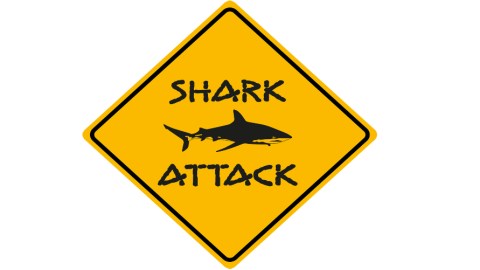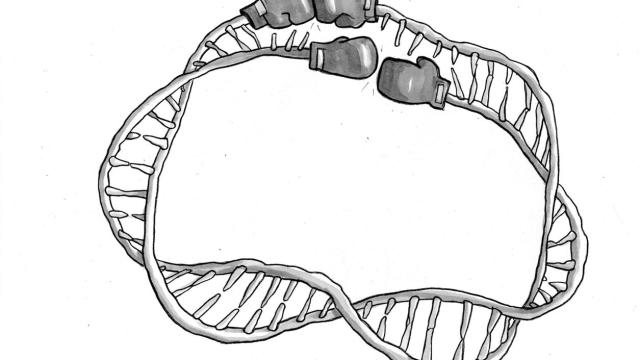SHARK ATTACKS!!! The Risk Is Tiny, but the Fear, and News Coverage, Are High. Why?

It’s the Summer of the Shark! Again. An unusual spate of attacks off North Carolina, bumping up against the July Fourth “Hey, Let’s Go to the Beach” holiday, has put galeophobia back in the news. And as always, the news coverage leads with the dramatic story of an individual victim and frightening detail about the terror of the attack, and only later notes that the fear is hardly commensurate with the risk. Which of course raises the question: Why the alarmist coverage in the first place?
The reason for the coverage is that the idea of being attacked by a shark, unlikely as it is, is scary. But why, if the odds are so low? Because our perception of risk is not just about the numbers. It’s about emotions too. There is no better example of how risk perception is more a matter of emotion than quantitative reasoning than this classic illustration of how our fears sometimes don’t match the facts.
Fact: Shark attacks are rare. Fatal shark attacks are REALLY rare. The International Shark Attack File recorded 72 confirmed unprovoked shark attacks on people in 2014, and only three deaths, worldwide. You are at greater risk of dying from … almost anything else … than from being attacked by a shark.
But then, you probably know that. The infinitesimally low statistical likelihood of being attacked by a shark is noted in all the Summer of the Shark stories. So when The New York Times asks, “Should Swimmers Worry About Sharks?” they know, and you know, that the answer is, basically NO. At least, not based on the numbers.
But that’s what makes shark attack such a brilliant example of the emotional nature of the psychology of risk perception. The numbers are not the whole picture. They’re not even the biggest part of the risk picture. It’s how we FEEL about the numbers that matters most. And it’s easy to understand why, if you use the example of shark attack.
Would you rather die of a ventricular fibrillation (v-fib), when you heart goes out of electrical rhythm and you collapse unconscious and just never wake up, or being eaten alive by a shark? Several hundred Americans a DAY die of v-fib. Sharks kill an average of 20 people or so, worldwide, per YEAR. Shouldn’t you be more worried about sudden cardiac arrest?
Well, no, because in terms of what scares us, it’s not just the likelihood of becoming dead that matters. It’s also the experience by which you become dead, and being furiously and painfully chewed to death is, fair to say, more than a wee bit nastier than going to sleep … and staying that way.
So the headline should ask, “Does it make sense for swimmers to worry about the experience of being attacked by a shark?” To which the answer is… well, yeah. For several discreet psychological reasons:
Pain and suffering, uncertainty and powerlessness, high awareness — those psychological characteristics make the idea of being attacked by a shark way scarier than the numbers do. And scary stories in the news grab our attention, because anything associated with danger instinctively and subconsciously triggers our brain to pay attention, in the name of survival. So shark attack stories get lots of coverage, which contributes to the fear.
So when a CNN anchor says, “When one shark attacks everyone takes notice and when 10 sharks attack people get scared,” she’s right. (Of course, she should add, “And when we cover these attacks with dramatic live reports and scary first-person stories, people get even more scared,” but that’s asking for a bit too much journalistic responsibility.) Fear is a feeling. Risk perception may sometimes seem to be irrational, but it makes perfect sense to be afraid of things that bear the emotional characteristics of something that feels dangerous. That’s how we protect ourselves, and survive.
Shark attack, of course, also demonstrates that we sometimes worry more than the evidence warrants, and sometimes we worry less than the evidence warns. And that, what I call the Risk Perception Gap, can be dangerous too. How many people go to the beach with inadequate protection from the carcinogenic radiation of the sun, because natural risks are less scary? Or pig out on meals at the beach and add to bodies already way overweight (please put on a shirt, people — you know who you are), disregarding the very real risk being overweight poses for cardiovascular disease, or sudden cardiac arrest. Why? Because we’re less afraid of risks that we engage in voluntarily, and over which we think we have some control: As in, “I’ll go on a diet and start exercising… tomorrow.”
Getting risk wrong can be risky all by itself. Knowing that we do, and why, is the first step toward thinking about risk a little more carefully, a little more objectively, which can produce choices that not only feel right but actually do us the most good. So, thank you, sharks off the Carolinas, and thank you, predictable Summer of the Shark news media feeding frenzy, for providing such a clarion example of the emotional nature of risk perception and a demonstration of the real danger we face because our fears so often don’t match the facts.





